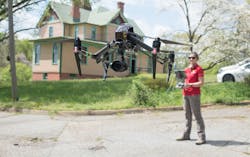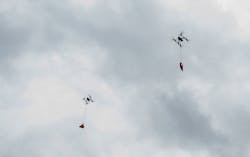UPS and Workhorse test drones to help COVID-19 response
As the world races to contain the COVID-19 virus and save lives, UPS and technology companies have a potential solution to increase testing and protect health care workers: autonomous drones.
Aerial drone companies DroneUp and Workhorse Group are working with UPS’s drone delivery subsidiary UPS Flight Forward and Virginia’s Center for Innovative Technology to see how unmanned aerial systems can help medical professionals stop the spread of the novel coronavirus.
The tests in Virginia earlier in April evaluated the commercial drone industry’s ability to use unmanned aircraft to assist the U.S. health care system during the novel Coronavirus crisis. UPS has found previous success using drones at health care facilities. For more than a year, UPS Flight Forward has been using drones to transport medical specimens at a North Carolina hospital.
“Drones can be an important way to deliver medical supplies while people stay home to adhere to our social distancing guidelines,” Virginia Governor Ralph Northam said on April 21. “Virginia is well-positioned to be a leader in the unmanned system industry, and we are pleased to be part of this initiative.”
Aerial drones can avoid road traffic and also reduce the number of people who come in contact with the cargo, which in the case of COVID-19 means a lesser potential for exposure to the highly contagious virus.
The COVID-19 related test exercises were held over three days earlier this month at the vacant St. Paul's College campus in Lawrenceville, Va. The facility, which closed in 2013, made for a safe, complex community environment to test package deliveries by drones under a variety of conditions, according to UPS.
The exercises focused on delivery to residential and commercial areas with the aim of determining the following:
- Safe operational capacities based on existing technology, policy, personnel and environmental restrictions;
- Airspace de-confliction and operator safety policies necessary for peak use;
- Processes, policies and training to pilot efficient, safe and effective delivery operations during both day and night;
- Proposed policy changes that would allow more use of autonomous airborne advanced technologies.
“We’ve proven through ongoing commercial drone delivery programs that effective drone delivery of medical products is faster than conventional ground-based transportation,” Scott Price, UPS chief strategy and transformation officer, said this week. “Drones offer a low-touch option for delivery of lab specimens and medical products that could make a significant impact in an urgent response application.”
Data collected during this “fast-paced simulation” — as UPS called it — will be used to determine how private-sector drone operators can effectively supplement emergency response and patient care. The findings and recommendations will be included in a report to the White House, where leaders are considering what role the blossoming drone industry could play in the coronavirus response.
“We’re proud to be able to help through the use of our drone technology and aerospace team in this crisis,” said
Duane Hughes, the Workhorse Group CEO, noted that his company had made hundreds of autonomous drone deliveries in the National Airspace System over the last four years using its proprietary technology and electric delivery vehicles. “We have a comprehensive understanding of the benefits provided by a drone delivery when speed counts,” he said this week. “The people of Workhorse are ready to help through these trying times in any way we can.”
DroneUp provides end-to-end aerial data collection services for its drone clients and it also trains and deploys drone pilots for the commercial industries. Company CEO Tom Walker said that people have been asking how drones can help in a time of crisis.
“Rather than speculate, it is incumbent upon our industry to conduct operationally-based exercises that produce factual data and lessons learned to ensure we can respond safely, effectively and efficiently when called upon,” the DroneUp CEO said. “Data collected now will impact our capabilities beyond the COVID-19 outbreak we are currently facing.”
Virginia’s nonprofit Center for Innovative Technology has been a driver of innovation and entrepreneurship in the commonwealth since 1985. The center also houses the Virginia Unmanned Systems Center at CIT to support this growing industry.
“CIT is committed to exploring innovative responses to the COVID-19 pandemic including emergency package delivery by drones,” said Ed Albrigo, CIT president and CEO. “We appreciate the willingness of DroneUp, UPS and Workhorse to be part of the solution.”
Drone delivery is not new to Virginia, which was the site of the first consumer delivery by an unmanned Wing drone last year. Wing, which is an Alphabet Inc. subsidiary, transported packages from a pharmacy to a house in Christiansburg, Va, in October.
UPS launched its drone airline, Flight Forward, last fall after a successful pilot program of transporting medical specimen at a North Carolina hospital. UPS has been working on expanding its drone delivery services to other hospitals, universities and corporate campuses around the U.S. Other companies, including Amazon.com Inc.’s Prime Air, also are developing drone-delivery platforms.
About the Author
Josh Fisher
Editor-in-Chief
Editor-in-Chief Josh Fisher has been with FleetOwner since 2017. He covers everything from modern fleet management to operational efficiency, artificial intelligence, autonomous trucking, alternative fuels and powertrains, regulations, and emerging transportation technology. Based in Maryland, he writes the Lane Shift Ahead column about the changing North American transportation landscape.


